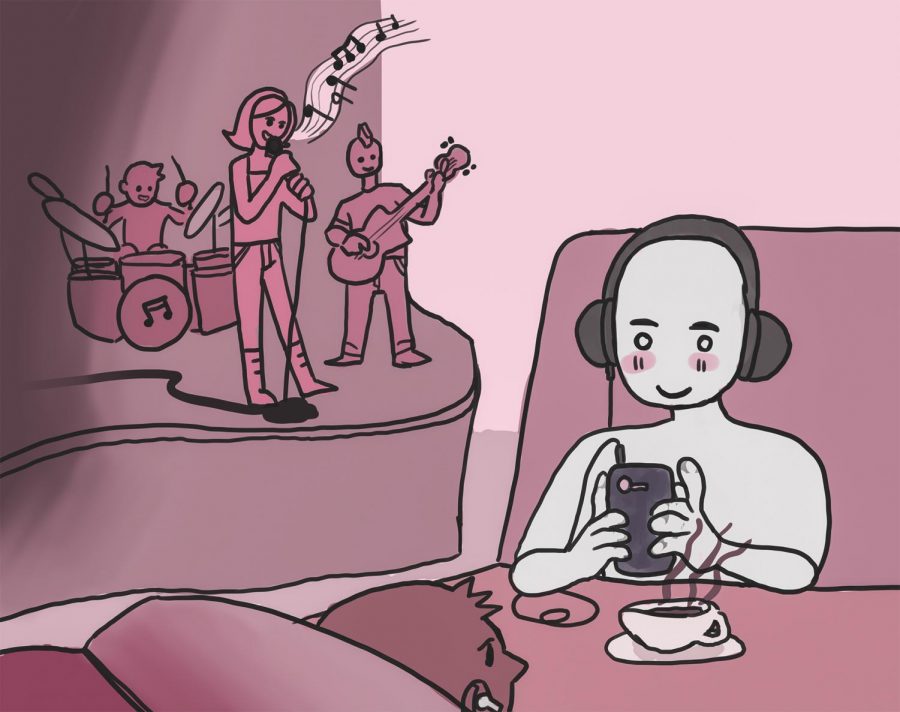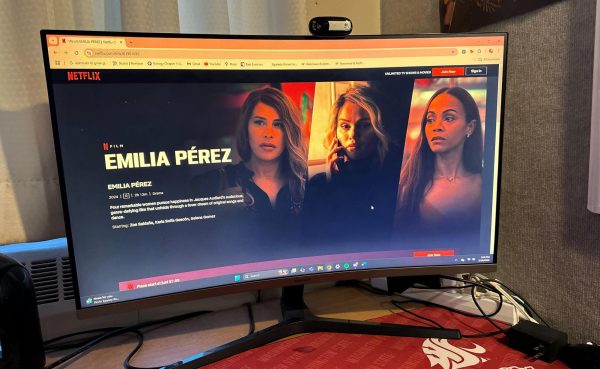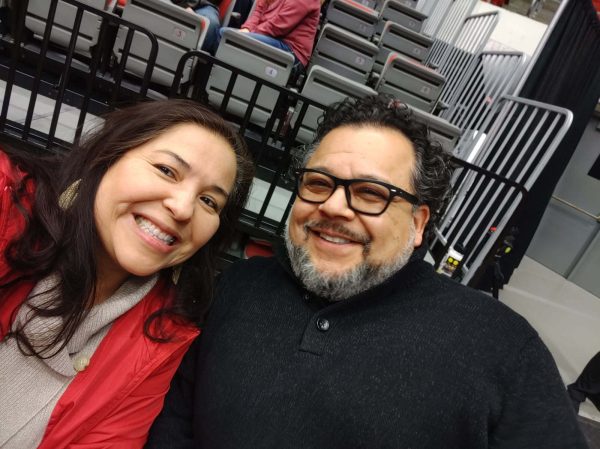We must support our local bands
Don’t rely on streaming your favorite local band to let them rake in the big bucks
NATALIE BLAKE | DAILY EVERGREEN ILLUSTRATION
Spotify is cool, but in reality most bands never see any large amounts from streaming. Instead find other options to support the music you love.
“The imminent demise of the large record companies as gatekeepers of the world’s popular music is a good thing, for the most part.” So says David Byrne, guitarist for noted ’80s new-wave band Talking Heads. I, for one, tend to agree with the opinion of anyone wearing a suit several sizes too large, but more to the point, Byrne speaks to the inadequacies of record companies and major labels to truly ensure artists fair and reasonable compensation for their work.
For the most part, music is streamed through a host of sites: Spotify, Apple Music, Pandora if you hate life and living, or even YouTube, for poorly ripped Slipknot songs from 2008, with a prominent note in the video description that reads something like “NOT MY MUSIC!! JUST A FAN.”
Internet quirks aside, streaming is, like it or not, the wave of the future.
Spencer Blome, freshman mechanical engineering major and the bassist for Redmond-based alt-pop band Velvet Mornings, voiced his issues with the Spotify business model.
“I think we made 10 dollars,” Blome said. “All your friends and your fans listen to it, but you’re not necessarily a big band. Ater the first month, those listens go downhill.”
Blome’s remark speaks to the daily grind nature of monetization on streaming services. When Spotify pays artists, on average, $0.006 per stream per song, it’s easy to see how smaller artists are left in the dust by larger industry-backed names.
When a TikTok teen choreographs some tasteless, overly-sentimental routine to whatever breathy multi-billion-dollar pop group happens to be flavor of the month, the great wheel of algorithmic music production rolls around again. And somewhere, another record executive in a hot tub pops a spontaneous boner.
That said, independent artists have found ways to get their music out in the open, albeit in smaller numbers.
Blome said the path to his band’s local fame was through playing at local teen centers, while self-producing CDs and merchandise.
“It was very hard to get out of that stage,” Blome said. “A lot of places where you’ll have low-key bands play are bars, and you can’t play at a bar unless you’re 21.”
Eddie Rohosy, WSU sophomore strategic communication and business double major, and lead guitarist for Pullman self-described “butt-funk” band Street Couch, described the band’s genesis in a similar style.
“Playing a lot of parties at Greek events, where it’s really easy to network and put yourself out there, that’s helped a lot,” Rohosy said.
Rohosy also attributed a fair amount of his success as a solo artist to the user-based music streaming platform SoundCloud.
“I sort of established myself as a pretty well-known artist in that community,” Rohosy said. “I’ve been doing music for years.”
The problem isn’t lack of originality or talent. The problem is disseminating the work of smaller artists via streaming services, so that they receive a fair cut of the profits. If artists are paid fairly for their streams, they have both the incentive and the means to continue creating music. It’s a win-win scenario, because the artist is paid more, and the streaming service gets more listeners, producing more overall revenue.
At its core, the streaming service and artist debacle is one of corporate greed and mismanagement. Streaming services and record companies are forcing independent artists to go along with minuscule streaming payments to get listeners.
It’s easy, however, to get caught up in the financial controversies inherent to the music industry and forget about the original intent of the artist: to create and have fun.
“None of us had this intention of the band being any more than us just jamming out and having fun with it,” Rohosy said.
For many aspiring musicians, college is the time to expand their sound, improve their technique and meet other like-minded artists.
“Being in a band is really fun, and it’s a great learning experience,” Blome said. “It definitely helps you become a better musician. I went into [the band] barely being able to play on tempo … but just through playing with other people, you learn so much more about your instrument.”
At the end of the day, musicians deserve to be fairly compensated for their work. Every dollar going to gild the third Ferrari for a Swedish record executive could instead, given fair streaming licenses, be going to support an independent local artist.
Jacob Hersh is a sophomore political science major from Anchorage, AK. He plans to go to law school post-graduation.














